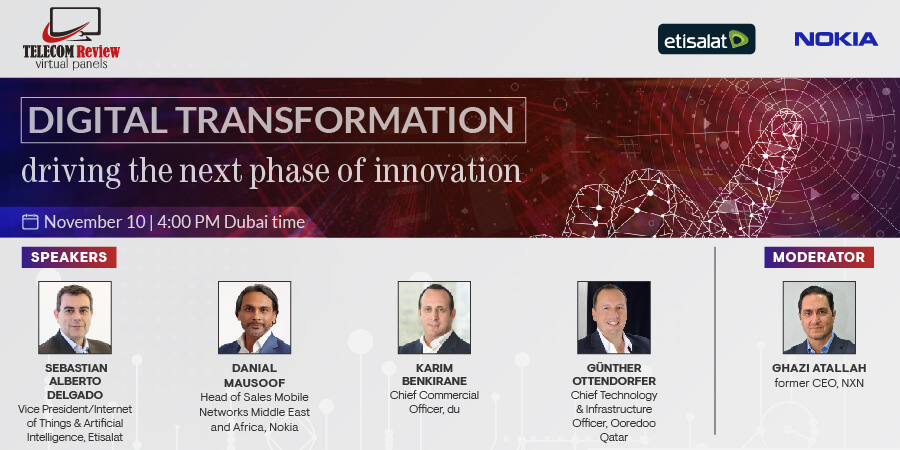Telecom Review’s latest virtual panel, entitled “Digital transformation driving the next phase of innovation”, explored various key points and shared insights on the opportunities of digital transformation, digital skills, as well as the acceleration of digital transformation among others.
During the session, the panelists responded to the various questions addressed by the moderator. One of the questions was discussing the top B2B segments that can be addressed through digital transformation services and what is the primary capability brought to those segments.
According to Sebastian Alberto Delgado, vice president, internet of things and artificial intelligence, Etisalat, “Digital transformation is happening across all industries and all of them have embarked in this journey in order to survive.” As an example, in sustainable cities, the government should be closer to citizens and all people visiting the country and communicate closely with them. He added, “For that, technology plays a major role in terms of communicating with them, and in terms of providing certain services that can mitigate some of the issues they face today such as traffic management. With smartphone applications and sensors in some areas, it will give immediate visibility to you where to go.”
Delgado added that automation is a must to be more competitive. “With the example of sensors, you can get all information in a single place in real-time; and then this information can be processed also in real-time with artificial intelligence algorithms to provide insights. Today, we are deploying some use cases in some manufacturing plants where the information is coming to our IoT platforms and our cloud, and it is processed to provide maintenance algorithms to detect any failure before it happens. This is a huge transformation and also a huge saving because we are preventing downtimes.”
Regarding digital health, he cited an example of electronic medical records existing nowadays, “Different hospitals or different clinics are able to obtain the patient’s information which improves the patient’s experience and sometimes saves lives because to have access to this information in real-time enables them to act immediately on the patient and the problem.”
In terms of automotive, Delgado mentioned how 5G will play a big role with autonomous cars. All the information coming from the infrastructure, roads, signals, and vehicles will be processed at the edge, “because we cannot have any delay, the latency should be at the level of milliseconds and then the car will be acting according to the information that it’s sensing but also according to the information that it is receiving from the infrastructure and other vehicles.” To put one example, “today with the combination of 5G technology and edge computing, a vehicle can react in 10 milliseconds in front of an incident. The reaction time of a driver is more than 100 milliseconds. This means again saving a lot of lives with the technology and with the innovation.
Furthermore, Atallah asked about who will be the winners and losers in this era of digital transformation in the next 5 to 10 years.
On this note, Sebastian Alberto commented that it is not a matter of sectors or industries, it is more a matter of how these companies are going to face these changes. “Customer experience is changing, so, at Etisalat, we have created co-creation labs which enables us to create with our customers the solutions, because these current models of creating your solutions and services inside of the company and then to put them in the market are no longer valid. What is valid is that you have to co-create those solutions with different methodologies together with your customers to go for MVP product very quickly and in an agile way.”
He added that the winners are going to be the companies that understand this digital transformation and they have already started it because if they still haven’t started with their journey, they are late and they will not survive. Losers are definitely the one who don’t believe that by using digital services and technology it is going to improve their competitiveness in the market.
Mausoof would not call out any specific industry, “Transformation is really a journey and there are some good strategies out there. I would be careful calling out winners and losers. The fundamentals are what we need to keep in check.” He said that one thing is going to be important, it’s obviously not letting the eye off the customer because that’s where the transformation will come. In addition, he fundamentally believes that technology investment is a priority, “Technology is an enabler and companies are really investing in R&D and this will surely see a good return on their transformation.”
Mausoof expressed that digital transformation should be more outcome-based than process-based, and he thinks that there is opportunity in healthcare which they’ve been trying to scratch for the last 10 to 15 years. “With the advances we have, healthcare is going to see a massive transformation. Given all the regulatory concerns that we will have in different countries, we will see a massive amount of investment in healthcare, we’re already seeing it, and we will see transformation taking a truly accelerated approach there.”
Gunther agreed that healthcare is quite important and stressed as well on transport and logistics and education. He sees a lot of winning opportunities in online education and easier education accessibility for broader ranges of population.
Karim thinks all sectors are winners, it just depends on how much they are going to take from this transformation journey. “In a telco space, we see that there is definitely a fintech industry who is going to grow and take the wave of this digital transformation. Telcos here have a really good opportunity to be more open into partnerships with this vertical.”






